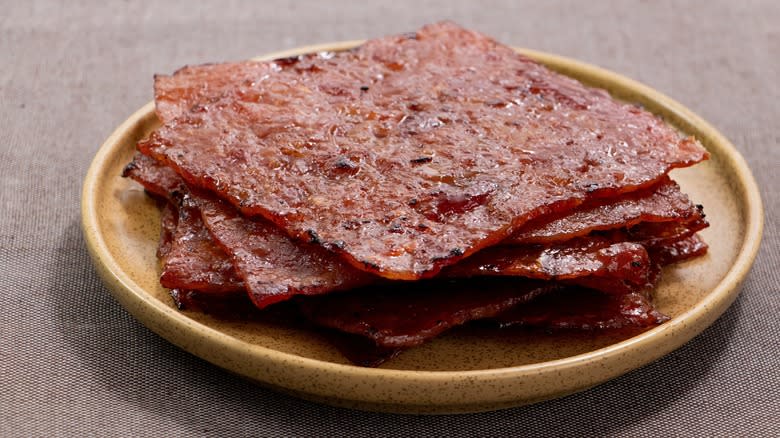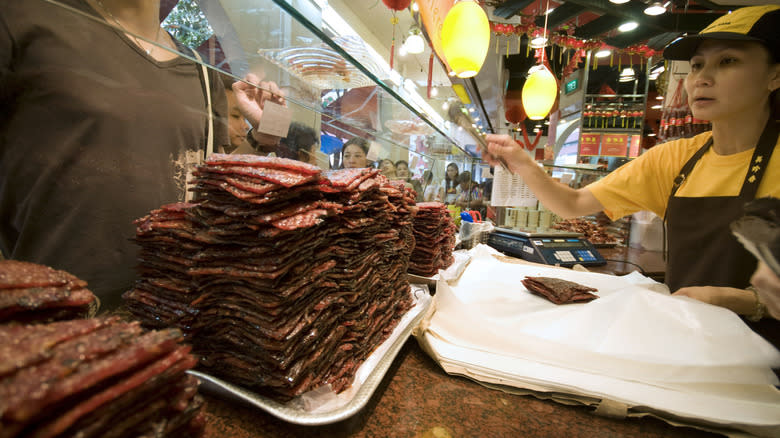Bak Kwa: The Ancient Pork Jerky Popular During The Lunar New Year

If smoking jerky is meant to preserve meat, then bak kwa is a preservation of a culinary art form. This pork jerky is incredibly popular in Singapore during the Lunar New Year, a time of good luck and renewal. But it's actually an ancient dish that dates back centuries. Bak kwa is strips of pork jerky that are marinated and cooked in charcoal ovens. Traditionally, the meat is left to bake and dry in the hot sun. However, although modern convenience has helped speed up the production of bak kwa, many shops still struggle to keep up with demand, especially during the Lunar New Year.
Competition between bak kwa shops is fierce, with many vendors refusing to share details of their marinades or how much they sell. However, common marinades are made up of fish sauce, sugar, soy sauce, and sesame oil, with a little seasoning. Traditionally, bak kwa is sold by street vendors as thin square sheets. But in recent years, shops have begun experimenting with the shapes of their pork jerky, selling it as small golden coins, shaped like pigs, and even heart-shaped. Additionally, bak kwa has begun to appear in other snacks, such as donuts or on top of pizza.
As a staple of Singaporean Lunar New Year celebrations, the lines to buy bak kwa are notoriously long, with customers waiting six hours or more for the treat. Likewise, some shops impose limits on how much can be purchased so that demand doesn't outstrip supply.
Read more: What These Imitation Foods Are Actually Made Of
The Origin Of Bak Kwa

Evidence of bak kwa has been found dating back 2,000 years. The origins of the jerky stem from ancient China, in the Fujian province, as a preservation method of the time. The practice of making bak kwa was spread thanks to immigration. During the 15th century, immigrants left Fujian for modern-day Malaysia, hoping to start a better life. The popularity of bak kwa spread to the region, with both countries cooking the meat in charcoal ovens.
The reason bak kwa is so popular at Lunar New Year is baked into its origins. In ancient Singapore, widespread poverty meant many people were unable to afford meats like pork. For some, this was considered a once-a-year treat reserved for the Lunar New Year, so many chose to buy bak kwa during this period, causing the pork jerky to become a yearly tradition. Singapore's first bak kwa store, Kim Hock Guan, opened in 1905. It was followed by several other shops, including Lim Chee Guan, Fragrance, and Kim Joo Guan among the most popular. As mentioned, many of these shops are fierce rivals competing against each other. Over the years, variations of the treat have evolved as retailers fought to attract customers.
Variations On Bak Kwa

Traditionally, bak kwa was made with marinated pork. However, over the centuries, variations of bak kwa have popped up. Similar to jerky in the United States, other meats have been subbed in for pork, such as chicken, beef, and even mutton. These are particularly popular among those who don't eat beef. Likewise, shops have begun serving new flavors, such as a spicier chili pork bak kwa variant.
Bak kwa is served in two ways in Singapore: minced and sliced. The sliced bak kwa is typically leaner and slightly chewier of the two. Minced bak kwa is softer and more tender due to having a higher percentage of fat in its meat. While it doesn't fall under traditions, bak kwa cooks constantly seek ways to innovate the dish. For instance, some cooks have made bak kwa from duck and crocodile meat. Others have turned to the oceans and tried lobster and shrimp for a seafood take on the jerky.
Walking through Singapore, you might come across bak kwa spiced with ginseng or mixed with cheese. Some have even pioneered a leaner version made with turkey for those put off by pork's fat content. However, it's unlikely that these variants will displace the original, which has stood the test of time.
Read the original article on Daily Meal.

